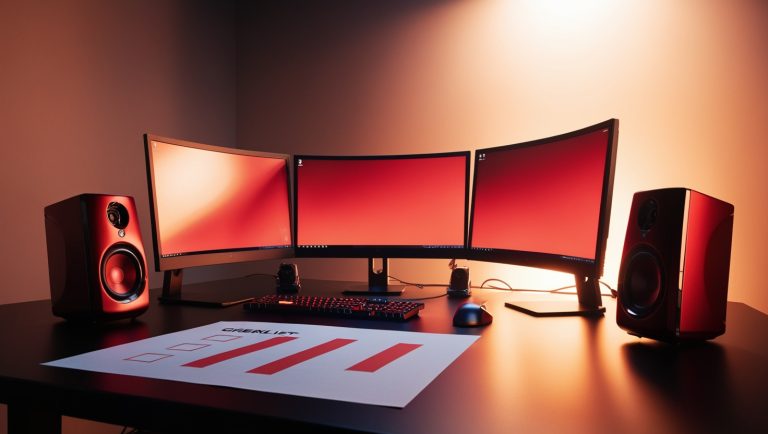When it comes to gaming monitors, the panel technology used can make a significant difference in your overall experience. At Grade A Technology, we often field questions from customers about which type of panel is best suited for their gaming needs. In this blog post, we’ll dive into the three main types of LCD panels – TN, IPS, and VA – and explore their strengths and weaknesses for gaming applications.
Before we delve into the specifics of each panel type, let’s briefly explain what these acronyms stand for:
- TN: Twisted Nematic
- IPS: In-Plane Switching
- VA: Vertical Alignment
Each of these technologies has its own unique characteristics that affect colour reproduction, response time, contrast ratio, and viewing angles. Let’s examine each in turn.
TN (Twisted Nematic) Panels
TN panels have long been the go-to choice for competitive gamers, and for good reason. They offer the fastest response times and highest refresh rates, which are crucial for fast-paced gaming.
| Pros | Cons |
|---|---|
| Extremely low response times (as low as 1ms) | Limited colour accuracy and reproduction |
| High refresh rates (up to 240Hz or even higher) | Poor viewing angles |
| Generally more affordable than IPS or VA panels | Lower contrast ratios compared to VA panels |
For gamers who prioritise speed over visual fidelity, particularly in competitive first-person shooters or fighting games, TN panels remain a solid choice.
IPS (In-Plane Switching) Panels
IPS technology has come a long way in recent years, making significant strides in response times and refresh rates while maintaining its superior colour accuracy and viewing angles.
| Pros | Cons |
|---|---|
| Excellent colour accuracy and reproduction | Generally more expensive than TN panels |
| Wide viewing angles | May suffer from IPS glow in dark scenes |
| Improved response times (now as low as 1ms in some models) | Lower contrast ratios compared to VA panels |
| Good refresh rates (up to 240Hz in newer models) |
IPS panels are an excellent all-rounder, suitable for gamers who also use their monitors for content creation or simply appreciate vibrant, accurate colours in their games.
VA (Vertical Alignment) Panels
VA panels strike a balance between TN and IPS technologies, offering deep blacks and high contrast ratios while maintaining decent colour reproduction and viewing angles.
| Pros | Cons |
|---|---|
| Highest contrast ratios, providing deep blacks and vibrant colours | Typically slower response times than TN and modern IPS panels |
| Good colour accuracy (though not quite as good as IPS) | May suffer from ghosting in fast-paced scenes |
| Better viewing angles than TN (but not as wide as IPS) | Can be prone to black level smearing |
| Decent response times and refresh rates |
VA panels are excellent for gamers who enjoy atmospheric games with dark scenes, as the high contrast ratio really makes these environments pop.
Which Panel Reigns Supreme for Gaming?
The truth is, there’s no one-size-fits-all answer. The best panel type for you depends on your specific gaming preferences and requirements. Here’s a quick guide to help you decide:
- If you’re a competitive gamer who values speed above all else, a TN panel might be your best bet.
- If you want a good balance of colour accuracy and speed, or if you use your monitor for both gaming and content creation, an IPS panel could be ideal.
- If you prioritise image quality, especially in games with dark scenes, and don’t mind slightly slower response times, a VA panel might be perfect for you.
It’s worth noting that panel technology is constantly evolving. Modern IPS panels, for instance, have significantly closed the gap in terms of response times and refresh rates, making them increasingly popular among gamers who don’t want to compromise on colour quality.
Other Factors to Consider
While panel type is important, it’s not the only factor to consider when choosing a gaming monitor. Here are a few other specifications to keep in mind:
- Resolution: Higher resolutions like 1440p or 4K can provide sharper images but require more powerful hardware to run games smoothly.
- Screen Size: Larger screens can be more immersive but may require you to sit further back for optimal viewing.
- Adaptive Sync: Technologies like NVIDIA G-Sync or AMD FreeSync can help eliminate screen tearing and stuttering.
- HDR: High Dynamic Range can greatly enhance the visual quality of supported games, but true HDR performance often comes at a premium.
Conclusion
Choosing the right monitor panel for gaming ultimately comes down to personal preference and priorities. At Grade A Technology, we stock a wide range of gaming monitors featuring all three panel types, allowing you to find the perfect balance for your needs.
Whether you’re a competitive esports player looking for the fastest possible response times, a casual gamer who wants vibrant, accurate colours, or someone who loves atmospheric games with deep, inky blacks, there’s a panel type out there for you.
We encourage you to visit our store and see these different panel types in action. Our knowledgeable staff can guide you through the pros and cons of each technology and help you find the perfect gaming monitor to elevate your gaming experience.
Remember, the best gaming monitor is the one that meets your specific needs and enhances your enjoyment of the games you love. Happy gaming!







